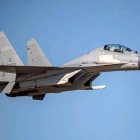Indo-Pacific tensions: China warns Philippines over military deployment with the US
Beijing sharply criticized the deployment, accusing the Filipinos of joining the US "war machine." Manila clarified that the maneuvers are not directed against any country, but admitted that they could have a deterrent effect against a possible conflict in Taiwan or in the South China Sea.

Chinese President Xi Jinping
China has issued a blunt warning to the Philippines amid the start of joint military maneuvers with the United States involving 14,000 troops and the deployment of advanced weaponry in strategic regions such as the South China Sea. These actions, according to Beijing, could destabilize the region and stoke tensions, leading Manila to position itself "on the opposite side" of regional interests.
A message of strength
Last Monday, the Philippines and the United States kicked off the 40th edition of the Balikatan military exercises, which will run for three weeks. With the participation of 10,000 U.S. and 4,000 Philippine soldiers, these maneuvers include air and anti-missile defense simulations, as well as the use of advanced weapons systems.
The provinces of Palawan and other areas near the disputed South China Sea are key scenarios for these operations, which has generated a strong reaction from China.
Philippine Gen. Romeo Brawner Jr., head of the Armed Forces of the Philippines, stressed that the exercises strengthen cooperative relations with the United States, which he described as a "peacekeeper" in the region.

World
Egypt and China conduct unprecedented joint military exercise in Egyptian airspace
Leandro Fleischer
For his part, the commander of the US Marines in the Pacific, James Glynn, said the US military will operate at the limit of its capabilities, emphasizing Washington's commitment to its Philippine ally.
China's response
Chinese Foreign Ministry spokesman Guo Jiakun sharply criticized the military deployment, accusing the Philippines of joining the US "war machine" to the detriment of regional stability. "He who plays with fire gets burned," Guo warned, noting that Manila's actions could trigger an arms race and disrupt peace in the Indo-Pacific. He also reiterated Beijing's stance on Taiwan, calling it an internal matter and opposing the use of this issue as an excuse to increase military presence in the region.
It should be noted that Beijing claims almost the entire South China Sea, despite a 2016 ruling by the Permanent Court of Arbitration that dismissed its claims. Territorial disputes with the Philippines, along with recent incidents between ships from both countries, have raised tensions, making this region a flashpoint in the rivalry between Beijing and Washington.
A region in turmoil
This year's Balikatan exercises are the first to feature observers from countries such as the Czech Republic, Lithuania, Poland and the Netherlands, reflecting a growing international interest in Indo-Pacific security.
In addition, the maneuvers include the deployment of the Typhon missile system, capable of reaching targets 2,500 kilometers away, covering the South China Sea and the Taiwan Strait. This system, stationed on the island of Luzon since April 2024, has been a constant sticking point with Beijing, which is demanding its withdrawal.
- Philippine General Francisco Lorenzo, director of the exercises, clarified that the maneuvers are not directed against any country, but admitted that they could have a deterrent effect in the face of a possible conflict in Taiwan or the South China Sea.
Regional and global implications
The escalation of tensions between the Philippines, the United States and China comes against a backdrop of growing rivalry in the Indo-Pacific. Washington has stepped up its military presence in the region, with deployments in countries such as Japan, Australia and South Korea, while Beijing has increased its naval capabilities, boasting a war fleet that includes 70 submarines and 45 destroyers.
The dispute over the South China Sea, through which 30% of global trade passes, continues to be a powder keg that could trigger a wider conflict.
The Philippines, for its part, faces a delicate balance. While it seeks to strengthen its alliance with the United States, it must also manage pressures from China, its main trading partner. Warnings from Beijing suggest that any misstep could have significant economic and diplomatic consequences for Manila.


























